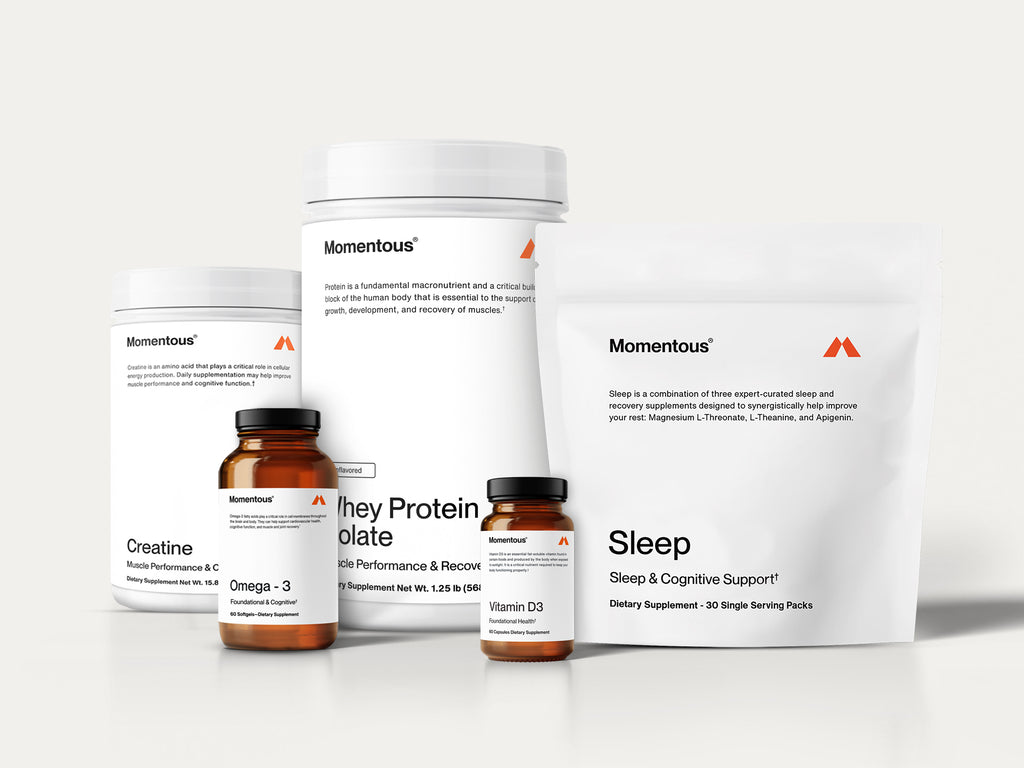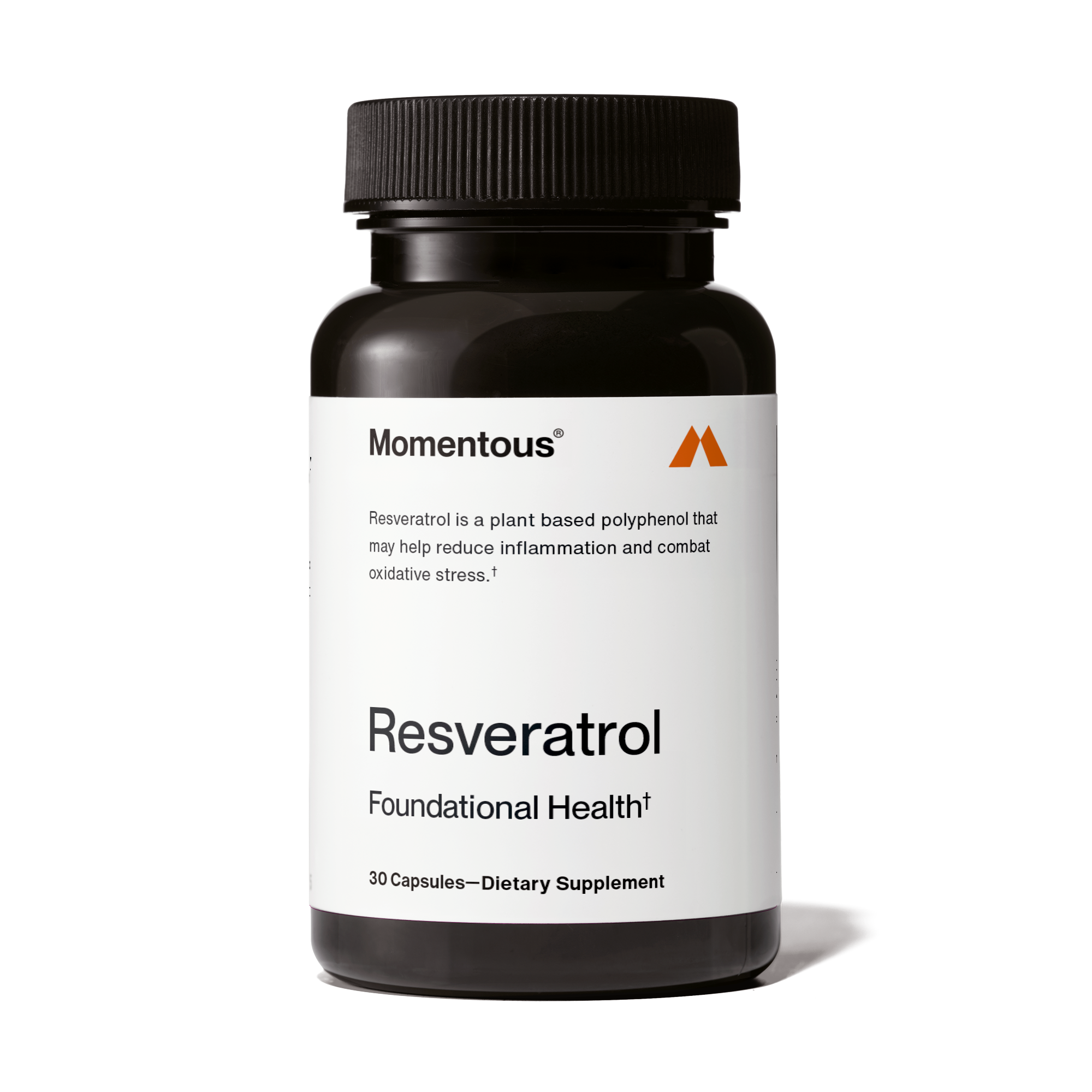Cognitive Function, Foundational Health
Have you ever heard of "The French Paradox"? It's a term scientists use to represent how France can have lower rates of heart disease while still enjoying a diet with so much butter, cheese, and cream.
While France is well known for its rich and fatty food, the French also consume more red wine per capita than almost any other nation. Researchers are beginning to zero in on this red wine consumption as a possible reason for this paradox—particularly a natural polyphenol found in the skin of red grapes, resveratrol.
What Are The Benefits of Resveratrol?
Resveratrol is a natural polyphenol found in around 70 plant species worldwide, including grapes, berries, peanuts, and, of course, red wine. It's increasingly being used as a supplement due to its ability to act as an antioxidant that prevents or slows damage to cells caused by free radicals.
Resveratrol is a potent antioxidant that could offer a wide variety of potential health benefits. So pour yourself a glass of your favorite red, and let's explore the benefits of resveratrol.
Improved Heart Health
As the French Paradox shows, one of the most well-known potential benefits of resveratrol is its ability to improve heart health. Numerous studies have shown that this antioxidant can help to improve cardiovascular health by reducing inflammation, improving blood flow, and more.
Studies have shown that resveratrol could lower blood pressure (1) (including both systolic and diastolic blood pressure) (3) and improve cholesterol levels (2). Another study showed that resveratrol supplementation improved cholesterol levels by decreasing LDL (bad) cholesterol and increasing HDL (good) cholesterol. (4)
Cancer Research
Improved heart health isn't the only promising outcome of resveratrol supplementation. There’s also initial studies that show possible assistance in certain types of cancer cells from forming, including gastric, colon, skin, breast, and prostate. NOTE: Reservatrol is not a treatment for cancer, nor is it proven to prevent cancer from occurring.
It's thought that it may inhibit cancer cell growth by preventing those cells from replicating and spreading (9). It's also possible that resveratrol may change the gene expression in cancer cells to inhibit their growth (10). Researchers are also looking at the possibility of resveratrol interfering with how certain hormones are expressed, which may prevent hormone-dependent cancers from spreading. (11).
Improve Cognitive Function
Studies have also indicated that resveratrol could improve your cognitive function by helping to slow age-related cognitive decline.
Resveratrol has the potential to improve brain health by protecting against certain neurodegenerative diseases. (5) In one study, resveratrol was able to protect neurons from damage caused by beta-amyloid plaques. (6) Beta-amyloid plaques are a hallmark of Alzheimer's disease and are thought to contribute to its development.
Reduce Inflammation
Reduced inflammation is another common benefit of resveratrol. This antioxidant is known for its anti-inflammatory effects, which can help improve various conditions.
Studies have shown resveratrol may help protect cartilage from deteriorating, effectively reducing symptoms of joint pain (7). Other studies have even injected resveratrol into arthritic joints and saw significantly less cartilage damage. (8)
A Promising Future
As you can see, a resveratrol supplement has many potential benefits. If you are interested in trying resveratrol, talk to your doctor first. And, as always, ensure you're getting a high-quality supplement.
----
(1) Liu, Y., Ma, W., Zhang, P., He, S., & Huang, D. (2015). Effect of resveratrol on blood pressure: a meta-analysis of randomized controlled trials. Clinical nutrition (Edinburgh, Scotland), 34(1), 27–34. https://doi.org/10.1016/j.clnu.2014.03.009
(2) Mendes, K. L., de Pinho, L., Andrade, J. M., Paraíso, A. F., Lula, J. F., Macedo, S. M., Feltenberger, J. D., Guimarães, A. L., de Paula, A. M., & Santos, S. H. (2016). Distinct metabolic effects of resveratrol on lipogenesis markers in mice adipose tissue treated with high-polyunsaturated fat and high-protein diets. Life sciences, 153, 66–73. https://doi.org/10.1016/j.lfs.2016.04.014
(3) Fogacci, F., Tocci, G., Presta, V., Fratter, A., Borghi, C., & Cicero, A. F. G. (2018). Effect of resveratrol on blood pressure: A systematic review and meta-analysis of randomized, controlled, clinical trials. In Critical Reviews in Food Science and Nutrition (Vol. 59, Issue 10, pp. 1605–1618). Informa UK Limited. https://doi.org/10.1080/10408398.2017.1422480
(4) Mendes, K. L., de Pinho, L., Andrade, J. M., Paraíso, A. F., Lula, J. F., Macedo, S. M., Feltenberger, J. D., Guimarães, A. L., de Paula, A. M., & Santos, S. H. (2016). Distinct metabolic effects of resveratrol on lipogenesis markers in mice adipose tissue treated with high-polyunsaturated fat and high-protein diets. Life sciences, 153, 66–73. https://doi.org/10.1016/j.lfs.2016.04.014
(5) Granzotto, A., & Zatta, P. (2014). Resveratrol and Alzheimer's disease: message in a bottle on red wine and cognition. Frontiers in aging neuroscience, 6, 95. https://doi.org/10.3389/fnagi.2014.00095
(6) Regitz, C., Fitzenberger, E., Mahn, F. L., Dußling, L. M., & Wenzel, U. (2016). Resveratrol reduces amyloid-beta (Aβ₁₋₄₂)-induced paralysis through targeting proteostasis in an Alzheimer model of Caenorhabditis elegans. European journal of nutrition, 55(2), 741–747.
(7) Mobasheri, A., Henrotin, Y., Biesalski, H. K., & Shakibaei, M. (2012). Scientific evidence and rationale for the development of curcumin and resveratrol as nutraceutricals for joint health. International journal of molecular sciences, 13(4), 4202–4232. https://doi.org/10.3390/ijms13044202
(8) Elmali, N., Baysal, O., Harma, A., Esenkaya, I., & Mizrak, B. (2007). Effects of resveratrol in inflammatory arthritis. Inflammation, 30(1-2), 1–6. https://doi.org/10.1007/s10753-006-9012-0
(9) Zulueta, A., Caretti, A., Signorelli, P., & Ghidoni, R. (2015). Resveratrol: A potential challenger against gastric cancer. World journal of gastroenterology, 21(37), 10636–10643. https://doi.org/10.3748/wjg.v21.i37.10636
(10) Tessitore, L., Davit, A., Sarotto, I., & Caderni, G. (2000). resveratrol depresses the growth of colorectal aberrant crypt foci by affecting bax and p21(CIP) expression. Carcinogenesis, 21(8), 1619–1622.
(11) Wang, T. T., Hudson, T. S., Wang, T. C., Remsberg, C. M., Davies, N. M., Takahashi, Y., Kim, Y. S., Seifried, H., Vinyard, B. T., Perkins, S. N., & Hursting, S. D. (2008). Differential effects of resveratrol on androgen-responsive LNCaP human prostate cancer cells in vitro and in vivo. Carcinogenesis, 29(10), 2001–2010. https://doi.org/10.1093/carcin/bgn131









